Another terrorist attack in J-K, militants shoot two non-locals in Budgam
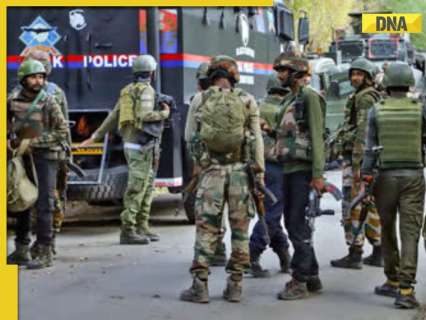
According to official sources, both the injured were immediately taken to a nearby hospital for treatment. Their condition was said to be stable.
Republicans are running a ‘successful’ early voting campaign in battleground North Carolina: NRCC chair
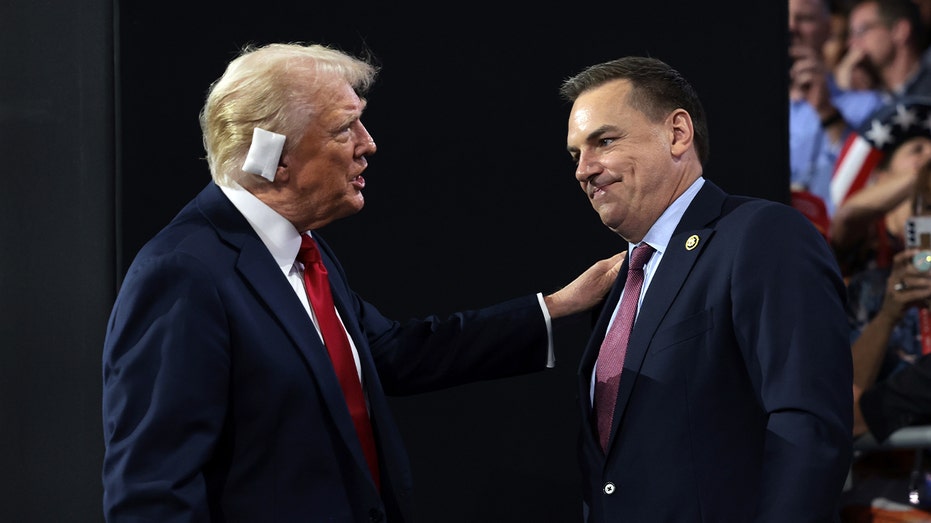
Republicans are running an intensive, “all-hands on deck” operation to get out the vote in North Carolina, targeting low-propensity voters in the battleground state recently impacted by a disastrous hurricane, says the chair of the Republican campaign arm. Rep. Richard Hudson chairs the National Republican Congressional Committee (NRCC) and represents North Carolina’s 8th congressional district. He spoke with Fox News Digital in an exclusive interview on GOP efforts to ramp up early voting in the state this cycle. “As more of our traditional voters vote, then that lets us spend our resources focused on adding more voters to the rolls or to the tally sheet and then turning them out. So it’s all hands on deck. The party’s bought into it. All our candidates are pushing it. And so far it’s been very successful,” Hudson said. North Carolina saw record turnout on the first day of early voting in the state, Oct. 17, when 353,000 registered voters cast their ballots. DEMS NEED TO RAMP UP EARLY VOTING EFFORTS TO MATCH GOP MOMENTUM IN NORTH CAROLINA: ANALYST “Certainly here in North Carolina, we’re seeing record turnout for Republicans,” he added. “And that’s good. That allows us to target lower propensity voters with our turnout efforts as we get closer to Election Day and on Election Day. And so I think it’s going to be a difference maker.” Republicans have put an emphasis on encouraging voters to vote early this year after seeing lower early turnout for the party compared to Democrats last cycle. As of Friday, the North Carolina State Board of Elections reported that Republicans are leading Democrats in early voting, 55% to 51%. BATTLEGROUND STATE VOTING DATA REVEALS OVER 200K VOTES CAST IN RED COUNTIES IMPACTED BY HURRICANE “It’s a culture change. Republicans are now really focused on early voting. We’ve done voter contact by knocking on people’s doors, calling them on telephones. We’ve done it through the mail, through digital contact.” Hurricane Helene had a severe impact on the state, specifically across western red counties which historically vote Republican. Despite the storm, there have been successful efforts to ensure voting access for those in the impacted western counties across the state. “It’s been a real challenge, but our state legislature, I think, did the right thing and passed a law that said if you live in one of those 25 counties that were affected by the hurricane, you can vote in any of our counties,” Hudson said. The North Carolina Elections Board passed a bipartisan emergency resolution that reformed the state’s early voting process in 13 counties, including changing or adding voting sites and maintaining their availability, extending the hours and adding or reducing when any site is open within the early voting period, according to the election board. Despite roadblocks to early voting, the North Carolina Board of Elections reported that Tuesday’s voter turnout in the 25 western counties affected by recent events is surpassing the statewide average. “I know a lot of folks are staying with relatives in other parts of the state. This will allow them to cast their votes. There’s also been an effort to add voting locations in those areas and to try to help people access those. There also was concern about absentee ballots being lost. And so we’re trying to help get new ballots to folks that need them,” Hudson told Fox. “There’s an all-hands on deck effort. But it’s a challenge because there’s a lot of communities that are still cut off, a lot of people who are still missing. And it’s just a real tragedy that it really is a lot more important than some of the other things.” As of Friday, about 49.32% of ballots were already cast in North Carolina for the 2024 election. In-person early voting in North Carolina ends on Saturday, Nov. 2.
Biden-Harris admin pushed more than 500 ‘DEI actions’ across government, report finds
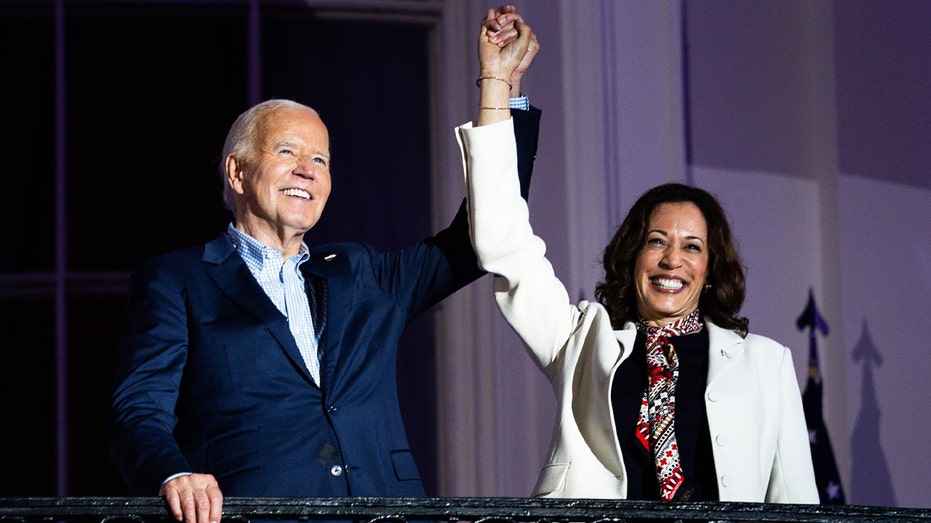
An analysis of more than 80 “Equity Action Plans” released by federal agencies in accordance with President Biden’s executive actions on diversity, equity and inclusion (DEI) revealed that the Biden-Harris administration embedded more than 500 DEI actions into the federal government. Do No Harm, a nonprofit group aiming to keep identity politics out of the medical field, found more than 200 DEI-focused measures tied to conducting research and tied to grant-writing, procurement and contracts. Meanwhile, DEI-related staffing expansions, DEI-focused training and outreach focused on minority communities accounted for close to 200 of the DEI-focused measures found by Do No Harm, as well. The remaining actions fell into an “other” category, which included measures such as the implementation of “racial equity” meetings and initiatives aimed at “reimagin[ing] many of our food and agriculture programs from an indigenous perspective.” Thirty-six of the more than 500 actions that Do No Harm cited were directly related to medicine and health care policy. “Discrimination has no place in our society and certainly not in our federal government,” said Dr. Stanley Goldfarb, chair of Do No Harm. “This report documents hundreds of examples of harmful identity politics leading to government programs that treat people differently based on their race or sexual orientation.” ‘SMACKS OF BLATANT VOTE-BUYING’: LEGAL EXPERTS CALL HARRIS PROPOSALS FOR BLACK MEN ‘UNCONSTITUTIONAL’ Multiple Biden-Harris administration programs that sought to provide benefits based on immutable characteristics, such as race and sex, faced legal challenges in court and were ultimately forced to shut down. For example, a federal judge blocked a Department of Agriculture program that gave preferences to farmers based on their sex and race, ruling that it discriminated against White male farmers. Meanwhile, a separate program aimed at providing restaurant owners with economic relief following the COVID-19 pandemic met a similar fate because it provided preference to candidates on the basis of gender and race. In addition to these programs, a federal judge also ruled recently that the Department of Commerce’s Minority Business Development Agency can no longer refuse assistance to White applicants. After Biden selected then-Sen. Kamala Harris to be his vice presidential running mate in 2020, the now-Democratic nominee for president argued that “there’s a big difference between equality and equity.” FLASHBACK: KAMALA HARRIS HAS REPEATEDLY PUSHED ‘EQUITY’ VS. EQUALITY MESSAGE AS VP “Equality suggests, ‘Oh, everyone should get the same amount’ … Equitable treatment means we all end up at the same place,” Harris said in a video she shared on social media. At the time, former Wyoming Rep. Liz Cheney, a Republican, said that Harris’ explanation of equality versus equity sounded “just like Karl Marx.” Cheney is now a Harris surrogate. Harris echoed this messaging during a Black History Month event in February 2021. CLICK HERE TO GET THE FOX NEWS APP “We must be clear-eyed about the fact that, yes, we want everyone to get an equal amount — that sounds right — but not everyone starts out from the same place,” Harris said at the event. “Some people start out on first base; some people start out on third base. And if the goal is truly about equality, it has to be about a goal of saying everybody should end up in the same place. And since we didn’t start in the same place. Some folks might need more: equitable distribution.” Fox News Digital reached out to the White House for comment but did not receive a response in time for publication.
Discovery of ‘fraudulent’ voter applications prompts PA probe of Arizona company’s potential involvement
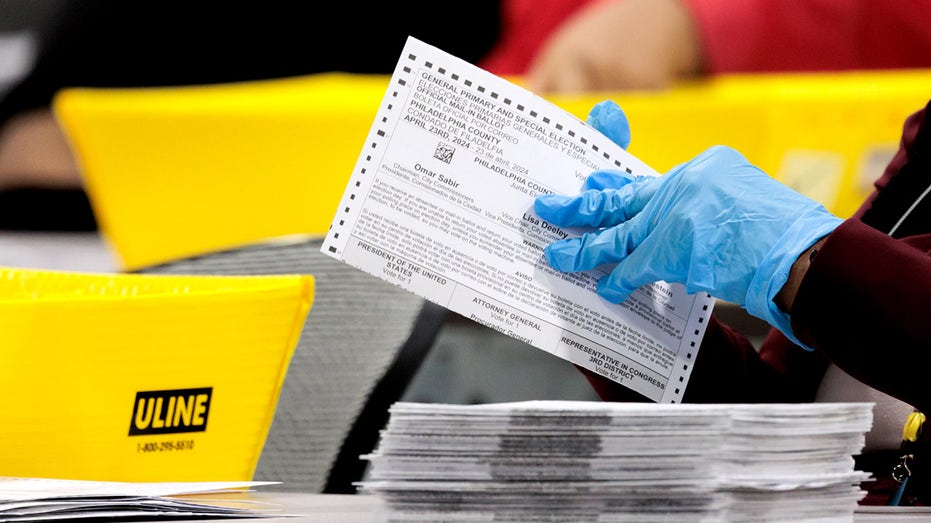
A Pennsylvania prosecutor is investigating roughly 30 voter registration applications and mail-in ballot applications that were identified as “fraudulent” – including several that officials linked to an Arizona-based group that is working in the county. The registration forms were spotted by the county’s board of elections officials, who then separated the forms and referred the matter for further investigation, Monroe County District Attorney Mike Mancuso said in a statement. At least some of the forms were submitted by “Field and Media Corps,” an apparent subsidiary of Fieldcorp, an Arizona-based organization working in Lancaster County, according to Mancuso. “The broader investigation continues with reference to Fieldcorp’s involvement,” he said. Mancuso urged residents to remain calm, noting that his office “is in regular contact and working with investigators from the Attorney General’s Office as well as others.” “A further update will be made in the next day or so,” he said. Monroe County did not immediately respond to Fox News Digital’s request for comment. The news comes after election officials in Lancaster County reported receiving two separate batches of apparently fraudulent or incomplete voter registration forms earlier this month. SUPREME COURT TEMPORARILY HALTS LOWER COURT RULING ORDERING 1,600 VOTERS BACK ON VIRGINIA VOTER ROLLS The 2,500 forms marked as suspicious either had false names, duplicative handwriting, or unverifiable or incorrect identifying information, officials said. The issues prompted county election officials to notify both the Pennsylvania Department of State and the state attorney general’s office to open a criminal investigation. The applications reportedly were not limited to a single party, and were collected in various spots across the county. Pennsylvania Attorney General Michelle Henry sought to reassure voters in the Keystone State, noting in a press release late Thursday that her office has been working with respective counties on the apparent attempts to submit fraudulent ballots and investigate any organizations that may be responsible. “While we will not be divulging sensitive information about these investigations, we want to clarify that the investigations regard voter registration forms, not ballots,” Henry said. “These attempts have been thwarted by the safeguards in place in Pennsylvania. We are working every day with our partners to ensure a fair, free, and safe election.” She added: “The investigations are ongoing, and offenders who perpetrated acts of fraud will be held accountable under the law.” Get the latest updates from the 2024 campaign trail, exclusive interviews and more at our Fox News Digital election hub.
November surprise: Dismal jobs report gives Trump last-minute political ammunition to fire at Harris
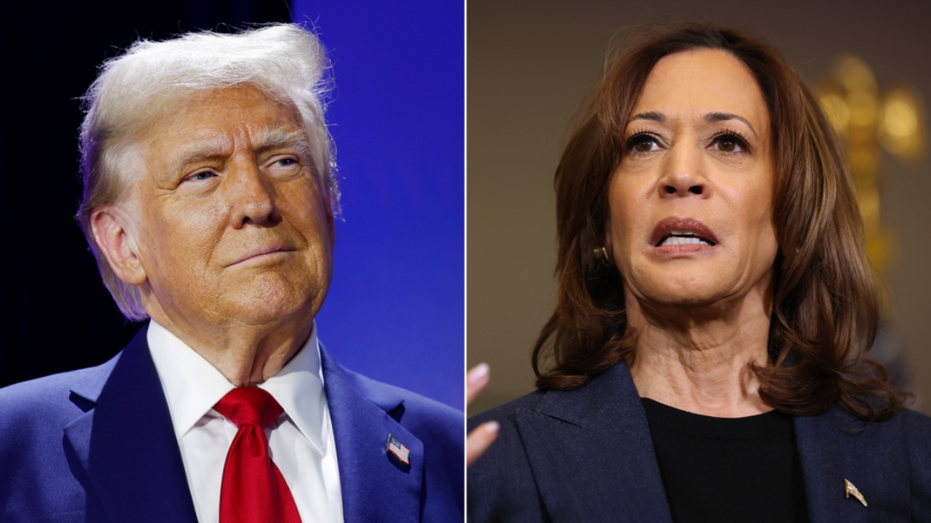
With four days to go before Election Day, former President Donald Trump’s campaign quickly took aim at Vice President Kamala Harris over the latest unemployment figures from the federal government, which indicated only 12,000 jobs were created in October. The jobs created last month were far below estimates of up to 120,000 and were the lowest in four years. Fueling the nosedive were disruptions from devastating Hurricanes Helene and Milton, the crippling Boeing strike and other labor disputes. However, regardless of the contributing factors, the figures offered the Trump campaign instant ammunition to fire at Harris, as two major party presidential nominees remain locked in a margin-of-error race in both the national polls and surveys in the crucial seven battleground states that will likely determine the White House winner. FOX BUSINESS DIGS DEEPER ON THE LATEST JOBS REPORT “BRUTAL,” was the instant reaction from the Trump campaign on social media, as it promoted clips of coverage of the jobs report from the cable news and business networks’ morning shows. HARRIS TAKES AIM AT TRUMP, SPELLS OUT AGENDA, IN CLOSING ARGUMENT IN FRONT OF A MASSIVE CROWD Minutes later, Trump campaign national press secretary Karoline Leavitt argued that “this jobs report is a catastrophe and definitively reveals how badly Kamala Harris broke our economy.” “Working families are being ripped off by the Harris-Biden economic agenda. Kamala broke the economy. President Trump will fix it,” Leavitt claimed. Jobs – up until now – have been a shining bright spot for the Biden-Harris administration, amid overall dismal public opinion ratings on the economy as the cumulative effort of inflation continues to weigh down on many Americans. President Biden, whom Harris replaced in July atop the Democrats’ 2024 national ticket, emphasized in a statement minutes after the Labor Department report on the jobs numbers that “unemployment was unchanged at 4.1%.” VICE PRESIDENT KEEPS HER DISTANCE FROM BIDEN IN FINAL STRETCH TO ELECTION DAY Additionally, he highlighted that “the devastation from Hurricanes Helene and Milton, and new strike activity, lowered job growth. Job growth is expected to rebound in November as our hurricane recovery and rebuilding efforts continue.” Touting the successes of the Biden/Harris administration, the president touted “America’s economy remains strong, with 16 million jobs created since I took office, including an average 180,000 jobs created each month over the last year—more than the year before the pandemic. We have the lowest average unemployment rate of any administration in 50 years, our economy has grown more than any presidential term.” Trump once held a large polling lead over the vice president when it comes to handling the economy, but many recent surveys pointed to the Democratic nominee narrowing the gap with the GOP standard-bearer on the issue, which remains upmost on the minds of American voters. The latest Fox News polling in battleground Michigan, released this week, indicated Harris just two points behind Trump in handling the nation’s economy. In Pennsylvania, the biggest prize of the key swing states, the former president’s advantage over the vice president on the issue was just four points. Get the latest updates from the 2024 campaign trail, exclusive interviews and more at our Fox News Digital election hub.
State treasurers push for divestment from China citing ‘red flags’ regarding CCP control
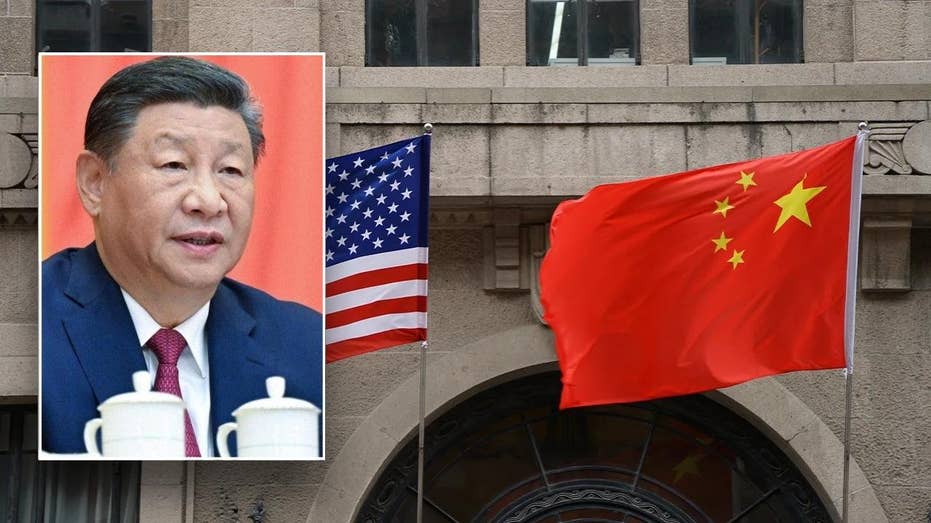
FIRST ON FOX: More than a dozen financial officers from 15 states are sending a letter to public pension fund fiduciaries, urging them to cut ties with China-based investments due to the Chinese Communist Party’s (CCP) control over some firms. “Trustees of state funds have a duty to investigate investments and a duty to monitor investments and divest from imprudent investments, in order to ensure that those funds grow and are protected for future beneficiaries,” the letter from 18 state treasurers stated to public pension fund fiduciaries, who include anyone managing a public pension fund. “The time has come to divest from China.” The 18 financial officers – who include some state treasurers – are from Alabama, Arkansas, Alaska, Arizona, Indiana, Kansas, Louisiana, Mississippi, Missouri, Nebraska, North Carolina, Oklahoma, Pennsylvania, South Carolina and Wyoming. ELON MUSK WANTS PEOPLE TO SUBMIT THEIR MEDICAL SCANS TO GROK, HIS AI CHATBOT Financial officers cited a crackdown by the CCP on due diligence firms, which has compromised the reliability of financial audits. They also pointed to CCP interference in stock and bond markets, where efforts to hide foreign investment outflows have been observed. The CCP maintains extensive control over Chinese companies, including the placement of military and intelligence personnel within them, the letter also states, and keeps the legality of Variable Interest Entities (VIEs) hidden. CHINA WILL DOUBLE ITS NUCLEAR ARSENAL TO OVER 1,000 WARHEADS BY 2030, ACCORDING TO US INTELLIGENCE These VIEs are offshore shell companies that are often seen as illegal under Chinese law, yet they represent the most common form of investment available to U.S. investors in China. The SEC has warned that the CCP could abruptly declare VIEs illegal, creating significant risks for those who invest in them. Geopolitical tensions, such as China’s potential invasion of Taiwan, are also of concern to investors. MILLIONS OF VOTERS HAVE ALREADY CAST BALLOTS FOR NOV. 5 ELECTION Moreover, there has been a notable decline in foreign investment in China, leading to substantial outflows from its markets, the officers warned. This trend has prompted other fiduciaries, including those from states like Florida Indiana, and Missouri, to reconsider their China-based investments. “Many fiduciaries, including state pension plans, failed to recognize similar warning signs before Russia’s invasion of Ukraine in 2022. As a result, states lost billions of dollars in value that was held in trust for retirees,” the letter states. “Pension boards should learn from the past, or they will be doomed to repeat it. As state financial officers, we urge public pension boards to analyze these issues, to identify China-based investments, and to divest from those investments in line with their fiduciary duties.” The bipartisan House Select Committee on the Strategic Competition between the U.S. and the CCP released a report earlier this year detailing how asset managers and index providers facilitated investment of more than $6.5 billion to 63 companies in China that have been blacklisted or red-flagged by the U.S. government. Under current law, U.S. government agencies maintain a variety of blacklists and red-flag lists that serve a range of purposes, from barring exports to covered foreign firms and blocking imports due to connections with the use of forced labor, to restricting purchases of equipment that poses a national security risk and more. Most of these lists do not restrict U.S. asset managers or investors from investing in listed companies. One list that does restrict U.S. investment in listed firms, the Treasury Department’s NS-CMIC list, blocks investment only in listed firms but excludes those companies’ subsidiaries, allowing them to receive U.S. capital. Fox Business’ Eric Revell contributed to this report.
Jailed Algerian journalist Ihsane El Kadi freed after presidential pardon
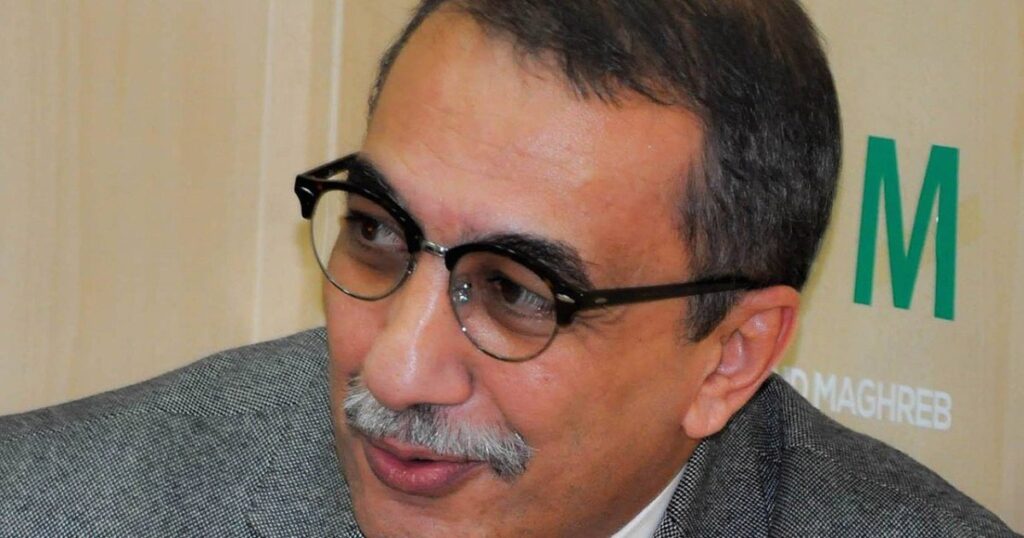
President Abdelmadjid Tebboune pardons 4,000 detainees to mark 70th anniversary of the independence war with France. Prominent Algerian journalist Ihsane El Kadi has been freed by a presidential pardon, his lawyers say, after being imprisoned for taking foreign funding for his media outlets and “threatening state security”. El Kadi, 65, was released on Friday after President Abdelmadjid Tebboune signed two decrees pardoning more than 4,000 detainees to mark the anniversary of the 1956-1962 conflict with France that led to the North African country’s independence. His lawyer Noureddine Ahmine posted on Facebook: “What joy! Ihsane El Kadi is free!” alongside a picture of the journalist at home with his family. Another lawyer, Nabila Smail, posted: “At last Ihsane El Kadi is back home with his loved ones. Freed on November 1. The end of a nightmare.” El Kadi, who heads Interface Medias, which includes the Maghreb Emergent news website and Radio M, had served a year and four months of the seven-year sentence he received in June 2023. Seven years is the maximum penalty under an article in the penal code that criminalises anyone who receives “funds, a grant or otherwise … to carry out acts capable of undermining state security”. He was first arrested in December 2022 and held under a state security law. In addition to his imprisonment, the court ordered the two media entities dissolved and ruled the two companies and El Kadi pay a total of 11.7 million dinars ($86,200) in fines. The two media projects were key outlets during the Hirak protest movement, which led to the resignation of octogenarian President Abdelaziz Bouteflika in 2019 after 20 years in power. Among the Hirak movement prisoners freed was Mohamed Tadjadit, 29, dubbed the “poet of the Hirak” for his recitations during the mass protests and for his posts on Facebook. El Kadi was sentenced to seven years after he appealed an initial five-year term for “foreign financing of his business”. His lawyers had argued that the funds had been sent by his London-based daughter Tin Hinane, a shareholder in his media group, to settle debts. El Kadi’s arrest sparked a wave of solidarity among his colleagues and rights activists in both Algeria and Europe. A petition by Reporters Without Borders, known by its French initials RSF, a media rights watchdog, attracted more than 10,000 signatures. RSF on Friday expressed “immense relief” at El Kadi’s release, saying it hoped this would “also signal a lifting of restrictions on press freedom”. Algeria ranks 139 of 180 countries and territories on RSF’s 2024 World Press Freedom Index. Adblock test (Why?)
Hope still exists for Turkey-PKK detente, despite deadly attack
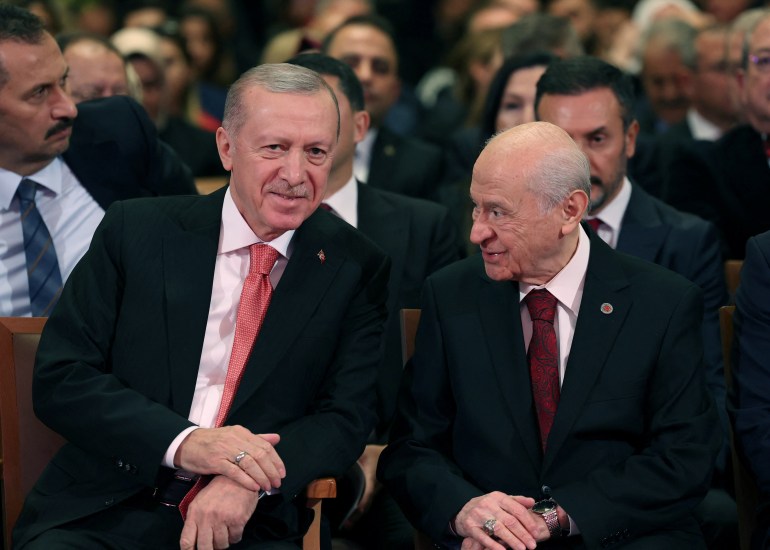
Istanbul, Turkey – The sight of Devlet Bahceli, the leader of the Nationalist Movement Party (MHP) walking across the floor of the Turkish parliament on October 1 and shaking hands with politicians from a pro-Kurdish party, DEM, was an unlikely one. The MHP leader, a close ally of Turkish President Recep Tayyip Erdogan, has been a vociferous opponent of Kurdish demands for more rights. He has referred to Kurdish politicians as “terrorists,” accusing them of links to the PKK, an armed group that is listed as a “terrorist organisation” by Turkey and the West. He also called for DEM’s predecessor to be banned. The promise of new peace negotiations between Turkey and the Kurdish fighters who have waged a 40-year rebellion was called into question last month after an attack on an aerospace plant near the capital Ankara. Bahceli later said his gesture was a “message of national unity and fraternity”. Weeks later, he raised the possibility that PKK leader Abdullah Ocalan, who has been serving a life sentence since 1999, could be granted parole if he renounced violence and disbanded his organisation. And then, the very next day on October 23, an attack on the TUSAS aerospace and defence company, which killed five people and left the two assailants dead, threatened to reverse the baby steps that had been taken. TUSAS manufactures civilian and military aircraft, including unmanned drones that have been crucial in combating the PKK, which has fought a war against the Turkish state since the 1980s, as part of an effort to claim more autonomy for Kurds living in southeastern Turkey. The PKK claimed responsibility for the TUSAS attack two days later. Its statement said the raid was not related to the latest “political agenda” but had been planned long before because TUSAS weapons “killed thousands of civilians, including children and women, in Kurdistan”. Turkish President Recep Tayyip Erdogan and Devlet Bahceli, leader of the Nationalist Movement Party (MHP), attend a Republic Day event to mark the republic’s 101st anniversary in Ankara, Turkey, on October 29, 2024 [Murat Kula/Presidential Press Office/Handout via Reuters] ‘Historic window of opportunity’ And yet, the attack may not be the death knell for the potential rapprochement as some initially feared. Instead, there seem to be elements of an underlying desire by both sides to push towards a solution to a protracted conflict that has killed tens of thousands. DEM quickly made it clear that they opposed the TUSAS attack, condemning it and saying that it was “meaningful” that it took place “when Turkish society is talking about a solution and the possibility of dialogue is emerging”. Even after the attack, Erdogan himself described the developments as an “unparalleled opportunity”. While commending Bahceli’s “will to focus on the right path” in an October 30 speech, the president said, “Those who read the calls of the MHP chairman in this context see the historic window of opportunity.” DEM is now reportedly trying to arrange a formal structure for peace negotiations involving senior figures from across the political parties. Ibrahim Akin, a DEM Party MP, described Bahceli’s remarks about Ocalan as a “sign of a new era” and an indication of the government’s approach. “However, there are still many things that are uncertain and cause hesitation,” he said. “We want a transparent process to be carried out in which all parties and all political actors are included.” Supporters of the pro-Kurdish DEM Party display flags with a portrait of jailed PKK leader Abdullah Ocalan during a rally to celebrate Newroz, which marks the arrival of spring, in Istanbul, Turkey, on March 17, 2024 [Umit Bektas/Reuters] Rationale Following the Ankara attack, Turkey launched a wave of air strikes against the PKK in Iraq and Syria. The group has directed its operations in Turkey from northern Iraq’s Qandil Mountains since the late 1990s. The Turkish military has severely curtailed PKK activity inside Turkey in recent years through the establishment of dozens of bases on the Iraqi side of the border and cross-border air strikes. In northeast Syria, meanwhile, Turkey has also targeted the PKK-affiliated People’s Defence Units (YPG), which the United States has supported since 2015 in the fight against ISIL (ISIS), providing weapons and training. American support for the Kurdish armed group strained Turkey’s relations with the US. While Turkey does not recognise any separation between the PKK and YPG, most Western states have declined to list the latter as a “terrorist” group. Speaking after the TUSAS attack, Erdogan said the two PKK assailants had crossed into Turkey from Syria, implicating the YPG. Some commentators see the rationale behind the latest push for talks as Erdogan’s desire to amend Turkey’s current constitution, which would not allow him to run for office again unless early elections are called. DEM – the third-largest party in parliament – could provide valuable backing. “The ruling coalition will probably try to amend the constitution to remove Erdogan’s time limits,” said Berk Esen, a political scientist at Istanbul’s Sabanci University. “They probably want to divide the opposition coalition and co-opt, if not directly the Kurdish political movement, then at least some Kurdish voters, particularly conservative Kurdish voters in southeastern Anatolia.” The idea of a deal between the Turkish government under Erdogan and the PKK is not as far-fetched as it perhaps might first seem. Erdogan’s Justice and Development Party (AK Party) made a strong effort in its early years in power in the 2000s to give more rights to Kurds in Turkey, who had long been a marginalised group. A peace process launched in 2013 appeared, at times, to come close to success before failing in 2015. The current move also comes at a time of extreme turmoil in the Middle East. US support for Israel has reportedly unsettled Kurdish groups, including the PKK, which has historical ties to Palestinian armed groups. DEM is highly critical of Israeli actions in Gaza and Lebanon. A second Donald Trump presidency would also likely see US troops pulled from Syria, removing protection for
Conservative Christians, Israel and the US vote
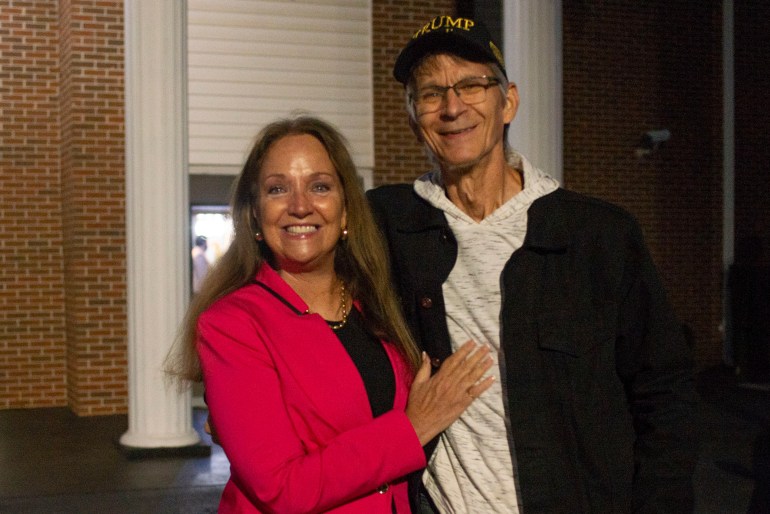
Trump and the Republican party continue to connect with several segments of Christian voters, a diverse group of denominations that spans racial identities and political perspectives. A Pew Research poll released in September found Trump commanded 82 percent of white evangelical Protestant voters, 58 percent of white non-evangelical Protestant voters, and 52 percent of Catholics. Harris, meanwhile, had 86 percent of support among Black Protestants, a group that has long skewed heavily Democratic. Those numbers are especially significant in a swing state like Georgia, which carries 16 Electoral votes and went to US President Joe Biden in 2020 by less than 12,000 votes. It was the first time the state had gone to a Democratic presidential candidate in 18 years. White evangelical Protestants – themselves divided into several sub-denominations – account for 38 percent of Georgia’s population. That is by far the largest segment of any religious group, followed by Black Protestants at 17 percent. Cindye and Stan Coates say they do not agree with the emphasis on Israel support from Republicans ahead of the vote [Joseph Stepansky/Al Jazeera] Evangelicals remain some of the staunchest supporters of Israel, according to a recent analysis of polling by the Chicago Council on Global Affairs. The entrenched support is rooted, in part, in some segments of the denomination that believe that Jewish people must be in control of Jerusalem for the second coming of Jesus, which will beckon in the Rapture, when living and dead Christians alike will rise to heaven. Polls have shown that up to 82 percent of white evangelical Protestants believe that Israel was given to the Jewish people by God, according to the analysis. The group is the most supportive of Israel out of all Christian denominations – at least 60 percent say they fully oppose putting any arms restrictions on Israel, while 64 percent believe that Israel’s actions in Gaza are justified. But the polls also show a more complicated story: Thirty-three percent of White evangelicals say they support some form of restrictions on aid to Israel, with another 11 percent reporting that they feel Israel has gone too far in the war on Gaza. That may be a reflection of wider trends within the Republican party, with a Data for Progress poll in October showing 52 percent of Republicans aged 18 to 29 supported an arms embargo on Israel. Speaking to Al Jazeera after buying a black “Make America Great Again” bucket hat in Austell, 20-year-old voter Troy said he was among those who were uncomfortable with continued aid to Israel, which he broadly categorised with other forms of foreign assistance, including large transfers to Ukraine amid Russia’s invasion. “I don’t really understand why Israel is that big of an issue in this election cycle,” said Troy, who declined to give his last name, but identified himself as an Anabaptist Protestant. “I don’t think the United States should be so involved in anything overseas like that. We keep sending billions to Ukraine, there are still people reeling from the hurricane that came through,” he said, referring to Hurricane Helene, which ravaged Georgia in September. For his part, Trump has framed himself as a “protector” of Israel, even as he has broadly claimed that the October 7 attack on southern Israel, which killed at least 1,139 people, and the war that has spiralled since would not have happened on his watch. Still, speaking during a debate in July, he said US President Joe Biden should allow Israel to “finish the job” in Gaza, and has also claimed to speak to Netanyahu on a near daily basis. Adblock test (Why?)
Top House committee subpoenas Biden admin for docs on faulty border cameras: ‘National security threat’
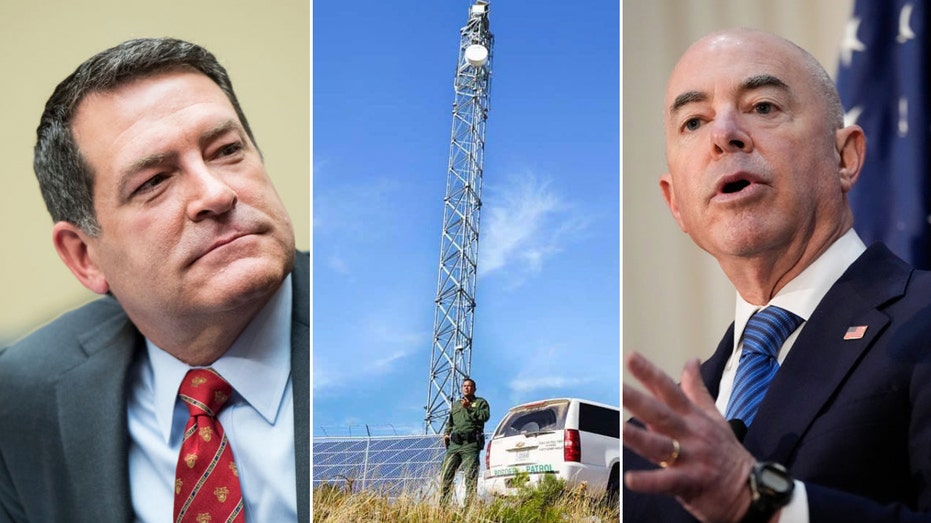
FIRST ON FOX: The House Homeland Security Committee has subpoenaed the Biden administration for documents related to what it says is a failure to operate and maintain surveillance cameras at the southern border after it did not receive a response to its demands for answers. Chairman Mark Green has issued a subpoena for documents and information requested on Oct. 16 relating to the working of Border Patrol’s Integrated Fixed Towers and Remote Video Surveillance System-Upgrade (RVSS-U) camera programs. “The exigency of this national security threat demands solutions from the Department, U.S. Customs and Border Protection (CBP), and Congress,” an accompanying letter to Department of Homeland Security (DHS) Secretary Alejandro Mayorkas says. WHISTLEBLOWERS CLAIM BORDER PATROL SURVEILLANCE CAMERAS ‘OUT OF SERVICE’ AS GOP DEMANDS ANSWERS FROM DHS Sources had told the committee that more than 66% of the RVSS-U cameras are inoperable, and maintenance is sometimes performed by non-U.S. citizens, which could be a violation of security policy. Whistleblowers had told the committee that some of the busiest Southwest border sectors have nearly 50 or more cameras offline with multiple towers that have been out of service for more than a year. “The failure to maintain camera operability in surveillance towers presents a grave national security threat. In the last four years, the Biden-Harris Administration’s disastrous border security and immigration policies have resulted in CBP encountering more than 8.4 million individuals at the U.S.-Mexico border, more than 10.4 million nationwide, and the escape of more than two million known gotaways into the interior of the United States,” Green said. “The Committee is deeply concerned that if nearly two-thirds of USBP’s remote surveillance tower cameras are inoperable, the total number of aliens that entered or will enter the United States without screening or vetting may be much greater than reported.” BORDER PATROL FACING LARGE-SCALE SURVEILLANCE CAMERA OUTAGE WITH ‘SIGNIFICANT IMPACTS’: REPORT Green said that DHS responded to the request by promising an Oct. 30 briefing to begin answering the questions, but documents were not provided, and the department later said the briefing “was not intended to be responsive” to that request. “The Committee requires the documents, information, and data compelled by the attached subpoena to fully evaluate potential legislation concerning both the standards of operability for USBP surveillance towers and the standards of contractor eligibility for contracts involving the maintenance and operation of USBP surveillance towers,” the letter says. NBC News had reported that an October memo said nearly one-third of cameras, roughly 150 of 500 cameras on surveillance towers, were out due to technical issues. The RVSS cameras are nearly 15 years old and are used to monitor areas of the border without the need for regular on the ground patrols. Agents also rely on a variety of detection and surveillance, including AI-powered towers, as well as helicopters, K-9s, the border wall and the agents themselves. Agents have noted the helpfulness of the automated surveillance towers, which are more advanced and use AI to track migrants and help agents locate them. CBP has deployed more than 300 of the towers. Officials say that RVSS is an old, costly system requiring regular maintenance and dedicated staff to monitor the cameras. That is opposed to the newer systems that use AI and provide alerts to agents in real time. A CBP spokesperson told Fox this month that CBP “utilizes a multilayered approach, including advances in technology to enhance border security along the southern, northern, and coastal/maritime environments.” CLICK HERE FOR MORE COVERAGE OF THE BORDER SECURITY CRISIS “While older technology like the Remote Video Surveillance Systems (RVSS) have been helpful operational tools for more than 15 years, they require significant maintenance and upgrades as they pass the end of their planned lifecycle. As systems go down, CBP works to resolve the issue by refreshing systems with new camera optics or replaces them entirely with a combination of mobile tower systems, aerial platforms, relocatable tower systems, and fixed observation posts to provide coverage in critical areas,” they said. “CBP continues to install newer, more advanced technology that embrace artificial intelligence and machine learning to replace outdated systems, reducing the need to have agents working non-interdiction functions within a local command center. To date, CBP has deployed 305 Automated Surveillance Towers (ASTs) and will deploy an additional 15 recently purchased Integrated Surveillance Towers (ISTs) in the coming months.” However, the situation has brought criticism from the National Border Patrol Council, which said it impacts agent safety. “Once again, we have another situation of ineptness from this administration, and it continues to show how out of touch DHS leadership is. Not only does this have an impact on the country by not knowing who or what is coming in, it also impacts the safety of the agents working the front lines,” said Art Del Cueto, vice president of the National Border Patrol Council. It comes days before the presidential election, where border security has been a top issue for voters, and both Vice President Kamala Harris and former President Donald Trump have sought to position themselves as the candidate best suited to secure the border after a yearslong migrant crisis. Fox News’ Bill Melugin and Stepheny Price contributed to this report.
